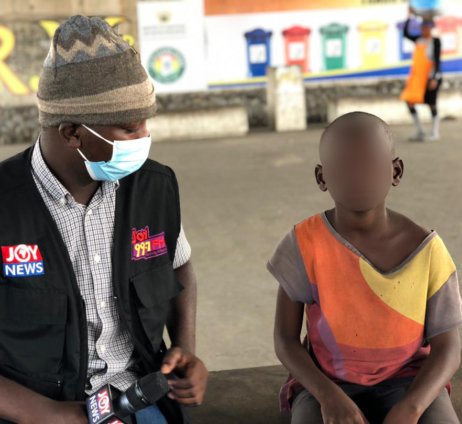The Department of Social Welfare Services of the Gender, Children and Social Protection Ministry says it will rescue little Ebenezer Opambuor, a 10-year-old homeless kid whose story was told on Joy News.
Born and raised in the border town of Sampa, somewhere in the Bono region, Ebenezer was excited about the prospects of visiting Accra for the first time.
But he will be left on his own shortly after arriving with his mom, who is now mentally challenged. Until the story was told by Joy News, Ebenezer roamed the streets of Accra by day and joined other squatters to sleep at the underbridge of the Kwame Nkrumah interchange at night.
But that is about to end. Head of Foster Care Services at the Social Welfare Department, Samuel Anaglate, tells Joy News, the department’s attention was drawn to the situation after the story was aired.
He added, “as we speak, officers at the department are currently on the grounds attempting to rescue him. We’ve also notified the Accra Psychiatric Hospital, and they will be picking up the lady to see whether we can treat her condition”.
Ebenezer’s story broke when city authorities stormed the underbridge of the Kwame Nkrumah Interchange to clear illegal occupants Wednesday. By that single exercise, what he knew to be home was gone too.
“I sleep under the overhead. My mother brought me from Sampa North in the Bono Region. But now I don’t go to school”, Ebenezer narrated.
Unlike the other squatters, Ebenezer was younger, and it wasn't easy to miss him. So why was he under the bridge on a Wednesday morning and not in school?
I will later find out his mom is mentally challenged, a reason little Ebenezer has been left roaming Accra’s perilous streets all by himself.
“I’m afraid a car will knock me down, but my family members are in Sampa North. So Rasta has been giving 1 cedi to buy food”, he explained.
The closest thing to a family Ebenezer knows in Accra is ‘Rasta’.
The 27-year-old himself, also homeless, goes about hustling to be able to give Eben 1 Ghana cedi for food. But they could go days without any proper food.
Rasta explained, “life is hard on the streets. I saw him and even got touched. So I decided that if I get the money, I’ll give him ¢1 or ¢2. I try to keep him close by”.
Like Eben, hundreds of kids are roaming the streets of Accra in search of warmth and support from a society that is constantly failing them. For now, though, that’s all he has.
In 2017, the Gender Ministry launched a campaign to end streetism in Ghana.
The programme dubbed “#Operation Get off the Streets for a Better Life” aimed to identify persons on the streets, profiling and integrating them with their parents, caregivers, families, and community in five years.
It was also to ensure that target groups are completely cleared from the streets.
The target groups included Kayayei, hawkers, children who are beggars, adult beggars, and those contracted to push physically challenged persons.
The rest are persons with disabilities, mental health problems, families on the streets, displaced persons (international migrants) and 'begging contractors'.
But four years after it was launched, the menace of streetism seems to have worsened, with various civil society groups calling for renewed efforts towards the agenda.
Latest Stories
-
Philipa Baafi bounces back with ‘Eda Ho Pefee’
3 mins -
Amazon Web Services and AmaliTech collaborate to train more than 5,000 people in cloud computing in Ghana
20 mins -
Inflation to decline to 24.6% in April 2024 – Report
26 mins -
Dancehall Queen Aklerh thrills patrons at EP listening
30 mins -
Bond market: Total turnover upturned to GH¢1.14bn
38 mins -
Stanbic offers financial solutions to members of Ghana Medical Association
49 mins -
“Dmusor” has brought businesses to their knees – GNCCI expresses frustration at ongoing crisis
55 mins -
Ghana’s electricity access likely to increase as World Bank begins initiative
56 mins -
We need a comprehensive data on the culture and creative sector– GCF to Egyapa Mercer
1 hour -
Veil on asset declaration should be lifted – Osafo-Maafo
1 hour -
I have been paid with malt drink and meat pie after performing – Kofi Sarpong
1 hour -
Child mortality drops to 32% nationwide in 2024 – Patrick Kuma-Aboagye
2 hours -
Cedi to bounce back to appreciating trajectory soon – Fitch Solutions
2 hours -
Dumsor: Finance ministry failed to pay power generators over GH₵1.2 billion under the CWM – PURC report
2 hours -
Toddler mauled by dog undergoes successful plastic surgery
2 hours

